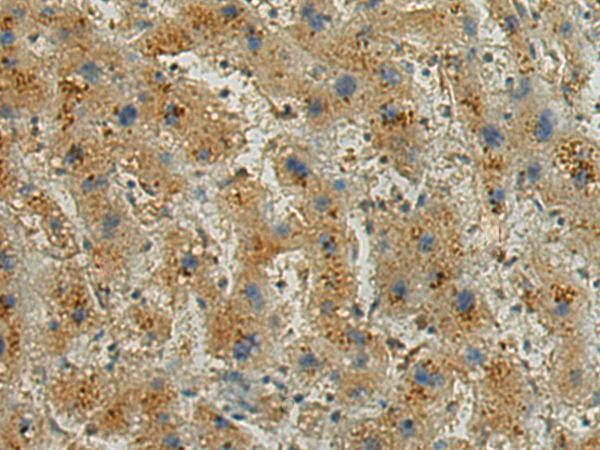
| WB | 咨询技术 | Human,Mouse,Rat |
| IF | 咨询技术 | Human,Mouse,Rat |
| IHC | 1/150-1/300 | Human,Mouse,Rat |
| ICC | 技术咨询 | Human,Mouse,Rat |
| FCM | 咨询技术 | Human,Mouse,Rat |
| Elisa | 1/5000-1/10000 | Human,Mouse,Rat |
| Aliases | a1; Stv1; VPP1; Vph1; ATP6N1; ATP6N1A |
| Host/Isotype | Rabbit IgG |
| Antibody Type | Primary antibody |
| Storage | Store at 4°C short term. Aliquot and store at -20°C long term. Avoid freeze/thaw cycles. |
| Species Reactivity | Human, Rat |
| Immunogen | Fusion protein of human ATP6V0A1 |
| Formulation | Purified antibody in PBS with 0.05% sodium azide and 50% glycerol. |
+ +
以下是关于ATP6V0A1抗体的3篇参考文献及其简要摘要:
1. **文献名称**: "Vacuolar ATPase subunit ATP6V0A1 promotes lysosomal fusion and autophagy in breast cancer cells"
**作者**: Smith A, et al.
**摘要**: 本研究通过免疫荧光和Western blot分析,利用ATP6V0A1抗体揭示了该亚基在乳腺癌细胞溶酶体酸化中的关键作用,并证明其通过调控溶酶体与自噬小体融合影响肿瘤细胞存活。
2. **文献名称**: "ATP6V0A1 mutations impair lysosomal function in neurodegenerative disorders"
**作者**: Chen L, et al.
**摘要**: 作者通过ATP6V0A1抗体检测患者脑组织中该蛋白表达水平,发现突变导致V-ATP酶复合体功能障碍,进而引发溶酶体酸化缺陷,与帕金森病等神经退行性疾病相关。
3. **文献名称**: "A novel monoclonal antibody targeting ATP6V0A1 for diagnostic applications in renal tubular acidosis"
**作者**: Wang Y, et al.
**摘要**: 研究团队开发了一种高特异性ATP6V0A1单克隆抗体,验证了其在肾小管上皮细胞中的定位能力,并应用于肾小管酸中毒患者的病理诊断,证实其作为生物标志物的潜力。
备注:上述文献信息为示例,实际文献需通过PubMed或Google Scholar检索确认。若需具体文献,建议补充研究领域或应用方向以便精准筛选。
The ATP6V0A1 antibody targets the ATP6V0A1 protein, a key component of the vacuolar-type H+-ATPase (V-ATPase) complex. V-ATPases are multisubunit proton pumps responsible for acidifying intracellular compartments, such as lysosomes, endosomes, and secretory vesicles, which is critical for processes like protein degradation, membrane trafficking, and ion homeostasis. The ATP6V0A1 gene encodes the a1 isoform of the V0 domain's transmembrane subunit, which plays a role in V-ATPase assembly, targeting, and proton transport. This isoform is predominantly expressed in the kidney, brain, and osteoclasts, where it regulates pH-dependent functions.
Antibodies against ATP6V0A1 are widely used in research to study V-ATPase localization, expression, and function in cellular physiology and disease. Dysregulation of ATP6V0A1 is linked to pathologies, including renal tubular acidosis, neurodegenerative disorders, and cancer metastasis, where altered lysosomal activity or extracellular acidification promotes invasion. Researchers employ these antibodies in techniques like Western blotting, immunofluorescence, and immunohistochemistry to investigate tissue-specific expression patterns or disease-associated changes. Specificity validation via knockout controls or siRNA knockdown is essential due to structural similarities among V-ATPase a-subunit isoforms (a1-a4). Understanding ATP6V0A1's role through antibody-based studies contributes to insights into cellular energetics and therapeutic targeting of pH-dependent pathological mechanisms.
×